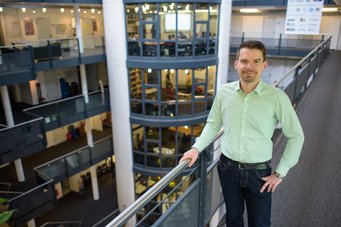Max Planck Institute for Informatics and Google engage in a strategic research partnership
The Max Planck Institute for Informatics in Saarbrücken (Germany) and Google have agreed on a strategic partnership to establish the Saarbrücken Research Center for Visual Computing, Interaction and Artificial Intelligence (VIA) at the MPI for Informatics. The center will conduct basic research in frontier areas of computer graphics, computer vision, and human machine interaction, at the intersection of artificial intelligence and machine learning. The VIA center will be headed by Christian Theobalt, scientific director at the Max Planck Institute for Informatics.

Christian Theobalt, director at the Max Planck Institute for Informatics, heads the Saarbrücken Center for Visual Computing, Interaction and Artificial Intelligence (VIA).
© MPI for Informatics
The initial funding from Google is over a period of four years with the intention of extending after the initial funding period has ended. Additional financial resources come from the Max Planck Institute for Informatics, both partners are committed to a long-term partnership.
Google and the MPI for Informatics will conduct joint research projects at the Saarbrücken Research Center for Visual Computing, Interaction and Artificial Intelligence (VIA). The focus of the center will be basic research and the resulting work is going to be openly published. The VIA will also work closely with Saarland University and the numerous, internationally renowned computer science research institutes at the Saarland Informatics Campus, which is among the top locations worldwide for research in the fields of computer graphics, computer vision, human-computer interaction and artificial intelligence.
Foundations of intelligent, interactive, immersive and autonomous computing systems
„The center will work on developing important methodical that could support humans in their private and work lives and that critically depend on advanced approaches in visual computing, interaction and artificial intelligence," explains the designated head of the new research partnership, Christian Theobalt. The research conducted at the center could lay the foundations, for example, for new ways to communicate and interact with and via computing systems of the future, for better ways to enable intelligent computing systems to perceive and safely interact with the human world, for new ways to simulate complex scenes with computer graphics, for new ways to build highly immersive virtual and augmented reality environments, or for innovative ways to create intelligent isual digital assistants.
Algorithms with enhanced explainability, robustness and trustworthiness
With the strategic partnership between the Max Planck Institute for Informatics and Google, two world-leading institutions in computer science from academia and industry are working together to advance demanding challenges of the field. "The Saarbrücken Research Center for Visual Computing, Interaction and Artificial Intelligence will pave the way for new algorithms that, on the one hand, empower profoundly advanced functional capabilities in the aforementioned areas, and at the same time enable better accountability for the underlying algorithms in the form of enhanced explainability, robustness and trustworthiness", says Shahram Izadi, Senior Director of Engineering and Research lead of AR at Google.
Saarland minister president Anke Rehlinger says: "The future forge [„Zukunftschmiede"] in Saarland is getting an outstanding boost. The cooperation between the Max Planck Institute for Informatics and Google is a great win for Saarland. The combination of top research and top companies can become the breeding ground of scientific knowledge on the one hand and economic strength on the other."






